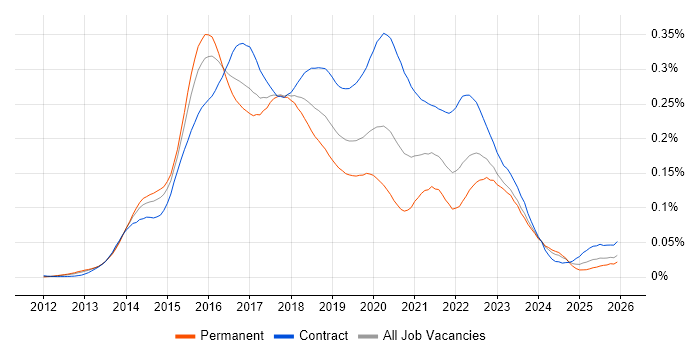Oracle Database 12c
UK
The table below provides summary statistics and salary benchmarking for jobs requiring Oracle Database 12c skills. It covers permanent job vacancies from the 6 months leading up to 14 January 2026, with comparisons to the same periods in the previous two years.
| 6 months to 14 Jan 2026 |
Same period 2025 | Same period 2024 | |
|---|---|---|---|
| Rank | 645 | 692 | 683 |
| Rank change year-on-year | +47 | -9 | +166 |
| Permanent jobs citing Oracle Database 12c | 8 | 7 | 38 |
| As % of all permanent jobs in the UK | 0.013% | 0.013% | 0.068% |
| As % of the Database & Business Intelligence category | 0.12% | 0.073% | 0.33% |
| Number of salaries quoted | 8 | 4 | 33 |
| 10th Percentile | £48,425 | - | £53,425 |
| 25th Percentile | £48,688 | £53,688 | £57,500 |
| Median annual salary (50th Percentile) | £57,500 | £60,440 | £60,000 |
| Median % change year-on-year | -4.86% | +0.73% | +14.29% |
| 75th Percentile | £62,500 | £65,452 | £62,500 |
| 90th Percentile | - | - | £76,658 |
| UK excluding London median annual salary | £60,000 | £59,125 | £60,000 |
| % change year-on-year | +1.48% | -1.46% | +20.00% |
All Database & Business Intelligence Skills
UK
Oracle Database 12c falls under the Databases and Business Intelligence category. For comparison with the information above, the following table provides summary statistics for all permanent job vacancies requiring database or business intelligence skills.
| Permanent vacancies with a requirement for database or business intelligence skills | 6,507 | 9,532 | 11,461 |
| As % of all permanent jobs advertised in the UK | 10.85% | 17.81% | 20.58% |
| Number of salaries quoted | 4,164 | 5,324 | 8,909 |
| 10th Percentile | £35,000 | £37,500 | £36,250 |
| 25th Percentile | £43,375 | £47,500 | £45,250 |
| Median annual salary (50th Percentile) | £60,000 | £63,900 | £60,000 |
| Median % change year-on-year | -6.10% | +6.50% | -4.00% |
| 75th Percentile | £80,000 | £85,000 | £77,715 |
| 90th Percentile | £100,000 | £114,775 | £95,000 |
| UK excluding London median annual salary | £52,500 | £55,000 | £52,500 |
| % change year-on-year | -4.55% | +4.76% | -4.55% |
Oracle Database 12c
Job Vacancy Trend
Historical trend showing the proportion of permanent IT job postings citing Oracle Database 12c relative to all permanent IT jobs advertised.

Oracle Database 12c
Salary Trend
Salary distribution trend for jobs in the UK citing Oracle Database 12c.

Oracle Database 12c
Top 6 Job Locations
The table below looks at the demand and provides a guide to the median salaries quoted in IT jobs citing Oracle Database 12c within the UK over the 6 months to 14 January 2026. The 'Rank Change' column provides an indication of the change in demand within each location based on the same 6 month period last year.
| Location | Rank Change on Same Period Last Year |
Matching Permanent IT Job Ads |
Median Salary Past 6 Months |
Median Salary % Change on Same Period Last Year |
Live Jobs |
|---|---|---|---|---|---|
| England | +67 | 8 | £57,500 | -2.75% | 3 |
| Work from Home | +72 | 7 | £60,000 | -2.84% | |
| UK excluding London | +59 | 7 | £60,000 | +1.48% | 3 |
| South East | +38 | 5 | £60,000 | +1.48% | |
| North of England | - | 2 | £50,750 | - | 2 |
| North West | - | 2 | £50,750 | - | 1 |
Oracle Database 12c
Co-Occurring Skills & Capabilities by Category
The following tables expand on the one above by listing co-occurrences grouped by category. They cover the same employment type, locality and period, with up to 20 co-occurrences shown in each category:
